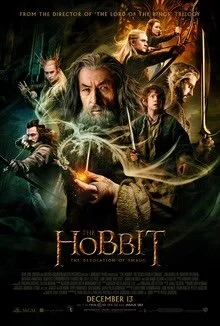Director: Peter Jackson
Cast: Ian McKellen, Martin Freeman, Richard Armitage, Benedict Cumberbatch
Have I Seen it Before: …yes? This is an ongoing debate in my house. We definitely remember going to see The Hobbit: An Unexpected Journey (2012) in the theater, but I couldn’t honestly say whether my wife and I have ever seen this one.
Did I Like It: Which should tell you something.
Second movies are tricky, especially where the trilogy has any degree of planning. Star Wars - Episode V - The Empire Strikes Back (1980) can stand on its own for the most part, but as the years go by, I’m extremely convinced Lucas had no plan as he proceeded, especially for the original trilogy. I might like Back to the Future - Part II (1989) just fine, but plenty of people view it as only part of a movie, and that’s a reasonable criticism to levy.
But when the middle part of the film is only supposed to comprise the middle portion of an entire novel? How can such a film not feel almost entirely of a second act, with the proceedings being nothing more than a cavalcade of incident rushing forth in anticipation of a catharsis that—at least theatrically—wouldn’t come for another year?
For a true analysis of how Jackson attempts to accomplish that, you might just have to wait for my review of The Hobbit: The Battle of the Five Armies (2014). There’s some fast dealing here. Fan service pads out the runtime*, forcing Legolas (Orlando Bloom, looking ten years older, despite being sixty years younger, but don’t tell anyone) into a story he didn’t exist in before. We are stuck with a cliffhanger for cliffhangers sake, made all the more strange by…
No. You know what? You will have to wait for my review of The Battle of the Five Armies. How does it feel, Peter Jackson? How does it feel?
*Jackson actually exhibits some restraint with the runtime in this series, as each film clocks in at under three hours, but what happened, man? The Frighteners (1996) was under 2 hours. You have the ability to do this!

